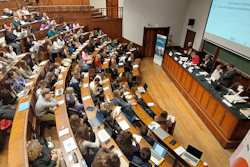Co-developed by Una Europa partners and eight African universities, Una Europa–Africa Partnership Seed Funding provides researchers with a unique opportunity to embark on an intercontinental research partnership.
Six projects have secured up to €36,000 to tackle global challenges informed by Una Europa’s Focus Areas. Each project is led by a coordinator from an Una Europa partner university, while the role of chairholder is taken on by an established researcher at a participating African university, enabling them to participate in a mobility fellowship to contribute their expertise to the project.
Discover the successful projects.
1. Enhancing Linguistic Scholarship in Eastern Africa (ELSEA)
Of the approximately 7,000 languages spoken in the world today, one third are endangered, and only around a half have been assigned a proper description – analysis of how that language is actually used (or how it was used in the past) by a community.
Language description is vital: it informs school materials and books, enhances understanding of cultural heritage and history, and determines the typology of language structures. However, local experts often lack the necessary training to tackle this vast task. The ELSEA project aims to overcome this gap by training early-career linguists in East Africa.
Project coordinator: Jenneke van Der Wal, Universiteit Leiden
Mobility fellowship chairholder: Saudah Namyalo, Makerere University
Participating universities: Universiteit Leiden, Makerere University, Helsingin yliopisto/Helsingfors universitet, University of Edinburgh
2. Cross-Continental Lessons: SME Green and Digital Transformation in Europe and Africa (gDTEA)
The small and medium-sized enterprises (SME) sector is a key contributor the global economy, accounting for up to 70% of employment and over 90% of businesses worldwide. However, most SMEs face myriad challenges, leading to a high failure rate.
Digital and green transformation (GDT) can help SMEs increase their operational efficiency, reduce costs, and improve performance.
The gDTEA project will chart the green and digital transformation journeys of SMEs in Kenya and South Africa, and surface data to inform policy and practice for sustainable development.
Project coordinator: Mustapha Douch, University of Edinburgh
Mobility fellowship chairholder: Duncan Elly Ochieng, University of Nairobi
Participating universities: University of Edinburgh, University of Nairobi, KU Leuven, University College Dublin/An Coláiste Ollscoile Baile Átha Cliath, University of the Witwatersrand
3. Global surveillance of antimicrobial resistance: tools, technologies and methods (GLOSAR)
Antimicrobial resistance (AMR) occurs when bacteria, viruses, fungi and parasites change over time and no longer respond to medicines. AMR is an increasingly serious threat to global public health, especially in low- and middle-income countries.
The GLOSAR project aims to tackle the spread of AMR by strengthening multidisciplinary education and research, raising awareness, and building networks between European and African universities to tackle AMR from a one health perspective.
Project coordinator: Annamari Heikinheimo, Helsingin yliopisto/Helsingfors universitet
Mobility fellowship chairholder: Mwangi Thumbi, University of Nairobi
Participating universities: Helsingin yliopisto/Helsingfors universitet, University of Nairobi, Universidad Complutense de Madrid, Université Paris 1 Panthéon-Sorbonne, University of Ghana
4. One Health Europe–Africa Summit on Veterinary Public Health & Food Safety (NEXTAFRICA)
Food safety is a major global public health concern. The cost of unsafe food to the economies of low- and middle- countries is in the region of USD $110 bn, while the African continent accounts for 30% of global deaths associated with foodborne illnesses.
The NEXTAFRICA project sets out to advance the discourse on food safety by coordinating the One Health Europe–Africa Summit on Veterinary Public Health & Food Safety at Alma Mater Studiorum - Università di Bologna. Through a series of workshops, NEXTAFRICA will foster collaboration among early-career and established researchers across Europe and Africa.
Project coordinator: Alessandro Seguino, Alma mater studiorum - Università di Bologna
Mobility fellowship chairholder: Clovice Kankya, Makerere University
Participating universities: Alma mater studiorum – Università di Bologna, Makerere University, University College Dublin/An Coláiste Ollscoile Baile Átha Cliath, Freie Universität Berlin, University of Edinburgh, Universidad Complutense de Madrid, Helsingin Yliopisto/Helsingfors universitet
5. Meeting the peak (PEAKSOLVE)
The human population is growing and projected to peak at approximately 10.5 bn within the next 50 years. Most of this growth will occur in Africa, while populations in many developed nations are already decreasing.
PEAKSOLVE will consider how to respond to these twin global
challenges: populations increasing on the one hand, and shrinking on the other.
Recognising to the particular challenge population growth poses for safe
drinking water access, PEAKSOLVE will equip early-career researchers with
cross-disciplinary skills to solve challenges relating to emerging
contaminants, freshwater systems, sanitation, water supply and governance.
Project coordinator: Margaret Graham, University of Edinburgh
Mobility fellowship chairholder: Craig Sheridan,
University of the Witwatersrand
Participating universities: University of Edinburgh, University of the Witwatersrand, Universiteit Leiden, Uniwersytet Jagielloński w Krakowie
6. Respiratory Health, Outdoor Air Pollution and Solid Waste Management: A Built Environment Perspective (RESPIRA_ABEP)
RESPIRA_ABEP will investigate the impact of mismanaged solid waste burning on air pollution and chronic respiratory diseases (CRDs). Focusing on Nakuru's Gioto and Nairobi’s Dandora dump sites, RESPIRA_ABEP aims to reduce air quality inequity and improve CRD care by involving communities in devising waste management strategies for more sustainable urban planning.
Activating existing partnerships with local stakeholders, RESPIRA_ABEP seek to enhance understanding of the role of waste in CRD management to inform policy.
Project coordinator: Pieter Van den Broeck, KU Leuven
Mobility fellowship chairholder: Margaret Ngima Macharia Kedogo, University of Nairobi
Participating universities: KU Leuven, University of Nairobi, Universiteit Leiden, Universidad Complutense de Madrid, Université de Kinshasa
Interested in Una Europa Seed Funding?
Get the latest updates on Una Europa Seed Funding and more opportunities for researchers straight to your inbox.



